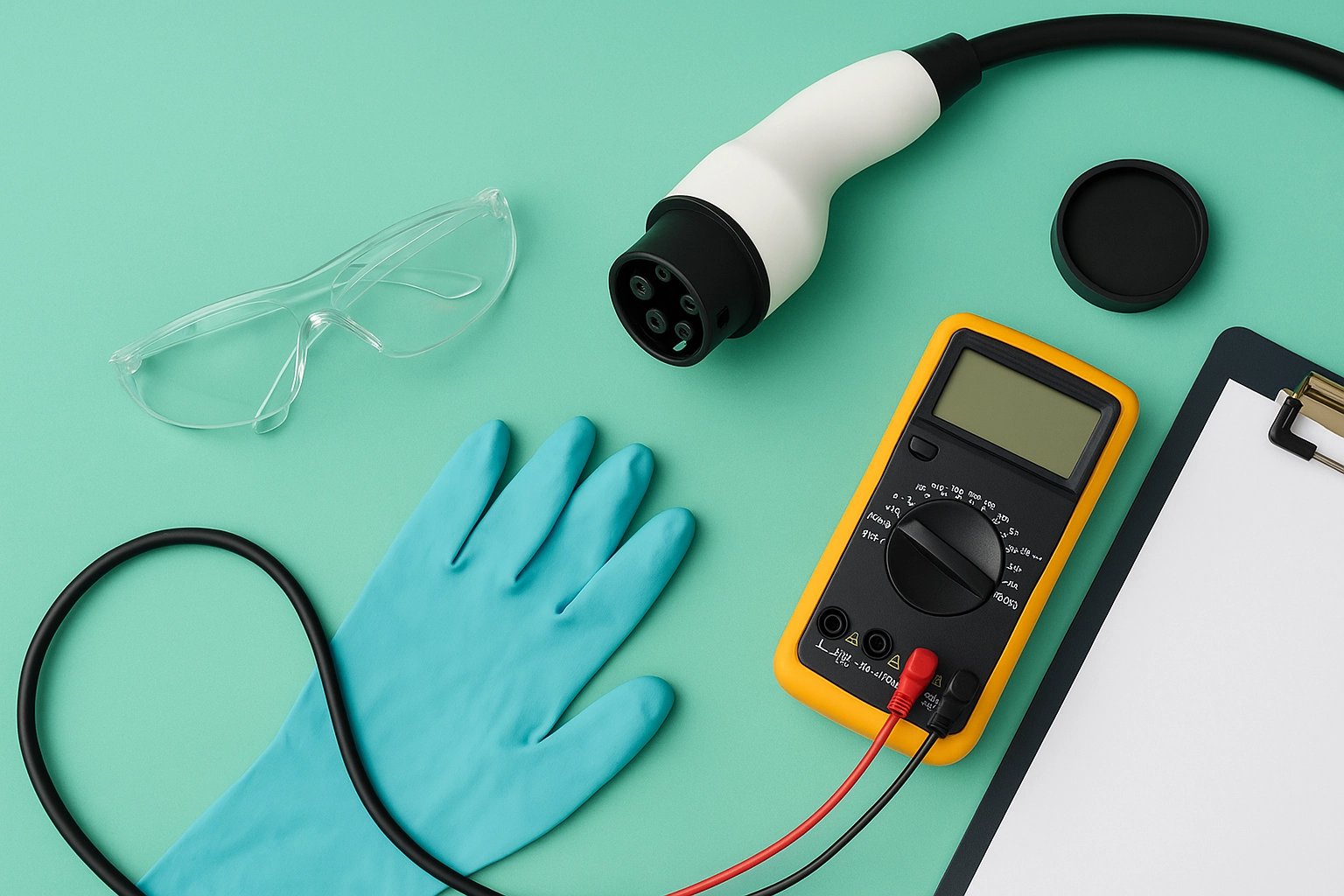IEC 62980 EV Charging Station Safety Function Test
The IEC 62980 standard is a crucial guide for ensuring that electric vehicle (EV) charging stations are safe and reliable. This test evaluates the safety functions of an EV charging station, focusing on critical areas such as electrical insulation, overcurrent protection, grounding continuity, and fault detection.
Compliance with IEC 62980 is essential for manufacturers to ensure that their products meet global safety standards. The testing process involves a series of checks to verify the integrity and performance of these crucial functions, ensuring they function correctly under various conditions.
The test scope includes detailed inspection procedures for all components involved in the charging process. This encompasses the control unit, connectors, cables, and power distribution units (PDUs). The apparatus used in this testing is designed specifically to simulate real-world conditions that EV charging stations encounter during operation.
During the test, various safety functions are verified by subjecting the charging station to a series of pre-defined stress tests. These tests are conducted according to the specified acceptance criteria outlined in IEC 62980. For example, the overcurrent protection function is tested by applying an excessive current to the system and monitoring its response.
Another key aspect of this test is grounding continuity verification. This ensures that there is no risk of electrical shock or damage to connected devices due to poor grounding practices. The test checks for proper grounding connections through resistance measurement techniques.
The fault detection function is evaluated by introducing simulated faults into the system and observing how well the charging station detects these issues. This helps ensure early warning systems are in place, preventing potential hazards before they become critical problems.
Testing also covers temperature rise tests to assess whether components can operate safely within specified limits without overheating. Additionally, electromagnetic compatibility (EMC) testing ensures that the device does not interfere with other electronic devices nearby.
Real-world usage notes indicate that compliance with IEC 62980 is increasingly becoming mandatory for manufacturers aiming to enter international markets or gain certification from reputable bodies like TÜV or UL. By adhering strictly to these standards, companies demonstrate their commitment to producing high-quality products that prioritize user safety above all else.
The process typically involves multiple stages of inspection and evaluation carried out by experienced technicians using state-of-the-art equipment calibrated according to international standards such as IEC 62980 itself. Compliance officers responsible for quality assurance can rely on this service to ensure their organization meets regulatory requirements while maintaining a strong reputation among consumers.
For R&D engineers looking into developing new models of charging stations or improving existing designs, understanding and implementing the safety functions specified in IEC 62980 provides valuable insights. This knowledge helps guide development efforts towards safer innovations that comply with global standards.
Why It Matters
The importance of ensuring EV charging station safety cannot be overstated, especially given the growing adoption rates of electric vehicles worldwide. Safety is paramount not only for protecting users from electrical hazards but also for fostering trust among consumers who rely on these stations.
Avoiding accidents related to faulty equipment protects both individuals and property. In addition, compliance with international standards like IEC 62980 helps companies avoid costly penalties associated with non-compliance or product recalls due to unsafe practices.
From a business perspective, adhering to these safety protocols can enhance brand reputation by demonstrating corporate responsibility towards public health and environmental sustainability goals. Moreover, it opens up opportunities for market expansion into regions where stringent regulations are enforced.
Industry Applications
| Application | Description |
|---|---|
| Manufacturing | Involves producing compliant EV charging stations that meet all necessary safety requirements. |
| Retail | Selling certified products to end-users who trust in their reliability and safety. |
| Installation Services | Ensuring correctly installed equipment operates safely without posing risks during use. |
| Government Agencies | Regulating the market by enforcing compliance with global standards like IEC 62980. |
- Manufacturers must ensure their products meet all safety requirements before going to market.
- Retailers need to sell only certified devices to maintain consumer confidence.
- Installation services play a crucial role in verifying proper installation practices.
- Government agencies are responsible for enforcing compliance through inspections and penalties.
Why Choose This Test
- Ensures strict adherence to international safety standards, enhancing trust among consumers.
- Avoids costly product recalls and potential legal issues resulting from non-compliance.
- Facilitates easier access to international markets by meeting regulatory requirements.
- Supports ongoing development of safer EV charging technologies through continuous improvement initiatives.
| Advantages | Benefits |
|---|---|
| Comprehensive Inspection | Covers all critical safety functions to ensure robust protection against hazards. |
| Expert Technicians | Utilizes skilled professionals who possess in-depth knowledge of the latest testing methodologies. |
| Accurate Equipment Calibration | Ensures precise measurements and reliable results, leading to consistent quality assurance across all tests. |
| Global Recognition | Certification from this service adds credibility to your brand, making it stand out in competitive markets. |





